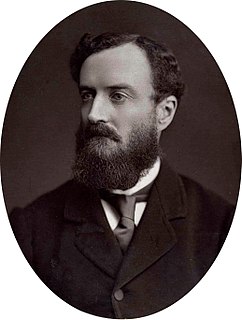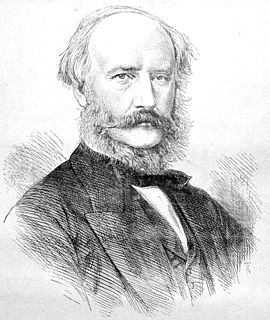
Viscount Hailsham, of Hailsham in the County of Sussex, is a title in the Peerage of the United Kingdom. It was created in 1929 for the lawyer and Conservative politician Douglas Hogg, 1st Baron Hailsham, who twice served as Lord High Chancellor of the Great Britain. He had already been created Baron Hailsham, of Hailsham in the County of Sussex, in 1928, also in the Peerage of the United Kingdom. Hogg was the son of the merchant and philanthropist Quintin Hogg, seventh son of Sir James Hogg, 1st Baronet, whose eldest son James McGarel-Hogg, 2nd Baronet was created Baron Magheramorne in the Peerage of the United Kingdom in 1887.

Earl St Aldwyn, of Coln St Aldwyn in the County of Gloucester, is a title in the Peerage of the United Kingdom. It was created in 1915 for the prominent Conservative politician Michael Hicks Beach, 1st Viscount St Aldwyn, known from 1854 to 1907 as Sir Michael Hicks Beach, 9th Baronet, of Beverston. He was Chancellor of the Exchequer from 1885 to 1886 and again from 1895 to 1902. Hicks Beach had already been created Viscount St Aldwyn, of Coln St Aldwyn in the County of Gloucester, in 1906, and was made Viscount Quenington, of Quenington in the County of Gloucester, at the same time he was given the earldom. Both titles are in the Peerage of the United Kingdom. He was succeeded by his grandson, the second Earl, the son of Michael Hicks Beach, Viscount Quenington, Member of Parliament for Tewkesbury, who was killed in action in 1916. Lord St Aldwyn was also a Conservative politician and was Captain of the Honourable Corps of Gentlemen-at-Arms between 1958 and 1964 and 1970 and 1974. As of 2018 the titles are held by his eldest son, the third Earl, who succeeded in 1992.

Viscount Combermere, of Bhurtpore in the East Indies and of Combermere in the County Palatine of Chester, is a title in the Peerage of the United Kingdom. It was created in 1827 for the prominent military commander Stapleton Stapleton-Cotton, 1st Baron Combermere. He had already been created Baron Combermere, of Combermere in the County Palatine of Chester, in 1814, also in the Peerage of the United Kingdom. He had previously inherited the baronetcy, of Combermere in the County Palatine of Chester, that was created in the Baronetage of England on 29 March 1677 for his great-great-grandfather Robert Cotton.

Baron St Levan, of St Michael's Mount in the County of Cornwall, is a title in the Peerage of the United Kingdom. It was created on 4 July 1887 for the former Member of Parliament Sir John St Aubyn, 2nd Baronet, becoming John St Aubyn, 1st Baron St Levan. He had previously represented Cornwall West in House of Commons as a Liberal and St Ives as a Liberal Unionist. He was succeeded by his eldest son, the second Baron, who was a Colonel and Honorary Brigadier-General in the Grenadier Guards. On his death the titles passed to his nephew, the third Baron, the son of the Hon. Sir Arthur James Dudley Stuart St Aubyn (1867–1897), second son of the first Baron. The third baron was succeeded in 1978 by his eldest son, the fourth baron, who had served with the Royal Navy at Dunkirk and in a minesweeper in Arctic Convoys during World War II and was awarded the Distinguished Service Cross (DSC). As of 2014, the titles are held by the fourth Baron's nephew, the fifth Baron, who succeeded in 2013.
Baron Bruntisfield, of Boroughmuir in the City of Edinburgh, is a title in the Peerage of the United Kingdom. It was created in 1942 for the Scottish Conservative politician and former Vice-Chamberlain of the Household, Sir Victor Warrender, 8th Baronet. The Warrender family descends from George Warrender. He was Lord Provost of Edinburgh and represented Edinburgh in Parliament. In 1715 he was created a baronet, of Lochend in the County of Haddington, in the Baronetage of Great Britain. His grandson, the third Baronet, fought at the Battle of Minden in 1759, represented Haddington Burghs in the House of Commons and served as King’s Remembrancer of the Court of Exchequer from 1771 to 1791. He was succeeded by his son, the fourth Baronet. He sat as a Member of Parliament for Haddington Burghs, Truro, Sandwich, Westbury and Honiton and notably served as a Lord of the Admiralty from 1812 to 1812. In 1822 Warrender was admitted to the Privy Council. On his death the title passed to his younger brother, the fifth Baronet. His grandson, the seventh Baronet, was a Vice Admiral in the Royal Navy. He was succeeded by his son, the eighth Baronet, who was raised to the peerage as Baron Bruntisfield, of Boroughmuir in the City of Edinburgh, in 1942. As of 2010 the titles are held by the latter's grandson, the third Baron, who succeeded in 2007. He is a retired officer in the British Army and investment banker.

Baron Croft, of Bournemouth in the County of Southampton, is a title in the Peerage of the United Kingdom. It was created in 1940 for the Conservative politician Sir Henry Page Croft, 1st Baronet. He had already been created a baronet in the Baronetage of the United Kingdom in 1924. Croft was the grandson of Reverend Richard Croft, third son of Dr. Sir Richard Croft, 6th Baronet, of Croft Castle. As of 2010 the titles are held by the first Baron's grandson, the third Baron, who succeeded his father in 1997. As a descendant of the sixth Croft Baronet of Croft Castle he is also in remainder to this title.

The Hogg Baronetcy, of Upper Grosvenor Street in the County of London, is a title in the Baronetage of the United Kingdom. It was created on 20 July 1846 for the lawyer and Conservative politician James Hogg. He was Registrar of the Supreme Court of Judicature and Vice-Admiralty Court in Calcutta for many years and also represented Beverley and Honiton in the House of Commons. His son, the second Baronet, was Chairman of the Metropolitan Board of Works in London from 1870 to 1889. On 5 July 1887 he was created Baron Magheramorne, of Magheramorne in the County of Antrim, in the Peerage of the United Kingdom, as part of the celebrations for the Golden Jubilee of Queen Victoria. The title is pronounced "Marramorn" and derives from a historic site in County Antrim near Larne.

Matthew White Ridley, 1st Viscount Ridley,, known as Sir Matthew White Ridley, 5th Baronet from 1877 to 1900, was a British Conservative statesman. He notably served as Home Secretary from 1895 to 1900.
William Laidlaw (1780–1845) was a Scottish poet. The son of a border farmer, he became steward and amanuensis to Walter Scott, and was the author of a well-known ballad, Lucy's Flittin.
Sir Michael Edward Lindsay-Hogg, 5th Baronet is a British television, film, music video, and theatre director. Beginning his career in British television, Lindsay-Hogg became a pioneer in music film production, directing promotional films for the Beatles and the Rolling Stones. Following his work with these bands, he branched out into film and theatre, while still maintaining successful careers in television and music video production.
Hogg is a Scottish or Irish surname.
There have been three baronetcies held by people with the surname Lindsay, one in the Baronetage of Nova Scotia and two in the Baronetage of the United Kingdom. One creation is extant.
The Hogg, later Lindsay-Hogg Baronetcy, of Rotherfield Hall in Rotherfield in the County of Sussex, is a title in the Baronetage of the United Kingdom. It was created on 22 December 1905 for Lindsay Hogg, Conservative Member of Parliament for Eastbourne from 1900 to 1906. He assumed by Royal licence the additional surname of Lindsay before that of Hogg in 1906.

Sir James Weir Hogg, 1st Baronet was an Irish-born businessman, lawyer and politician, who served in England as a Liberal Conservative Member of Parliament
Sir Lindsay Lindsay-Hogg, 1st Baronet was a British horse breeder and Member of Parliament for Eastbourne from 1900 to 1906.
Arthur Hogg may refer to:
William Hogg may refer to:
Events from the year 1835 in Scotland.
The 1905 Prime Minister's Resignation Honours were awards announced on 9 December 1905 to mark the exit of Prime Minister Arthur James Balfour, who resigned on 5 December.







